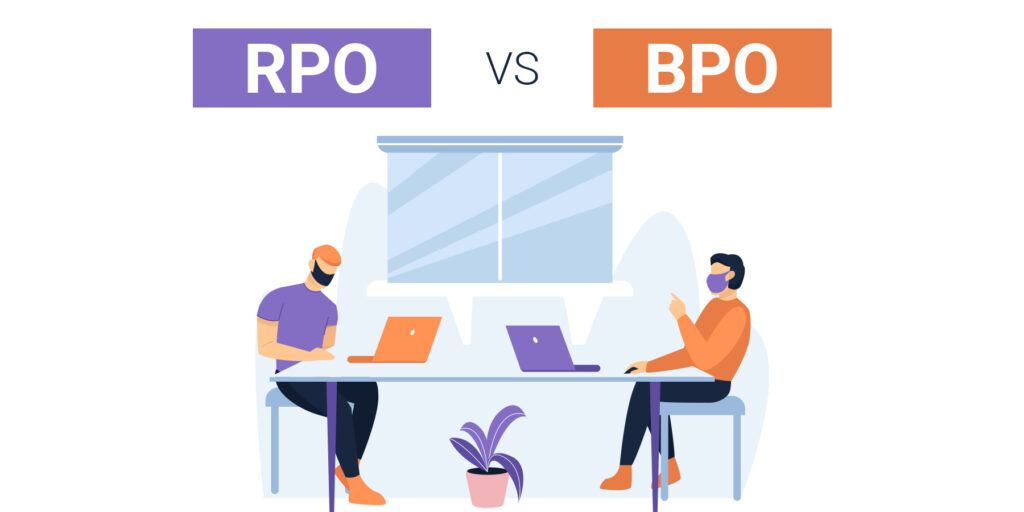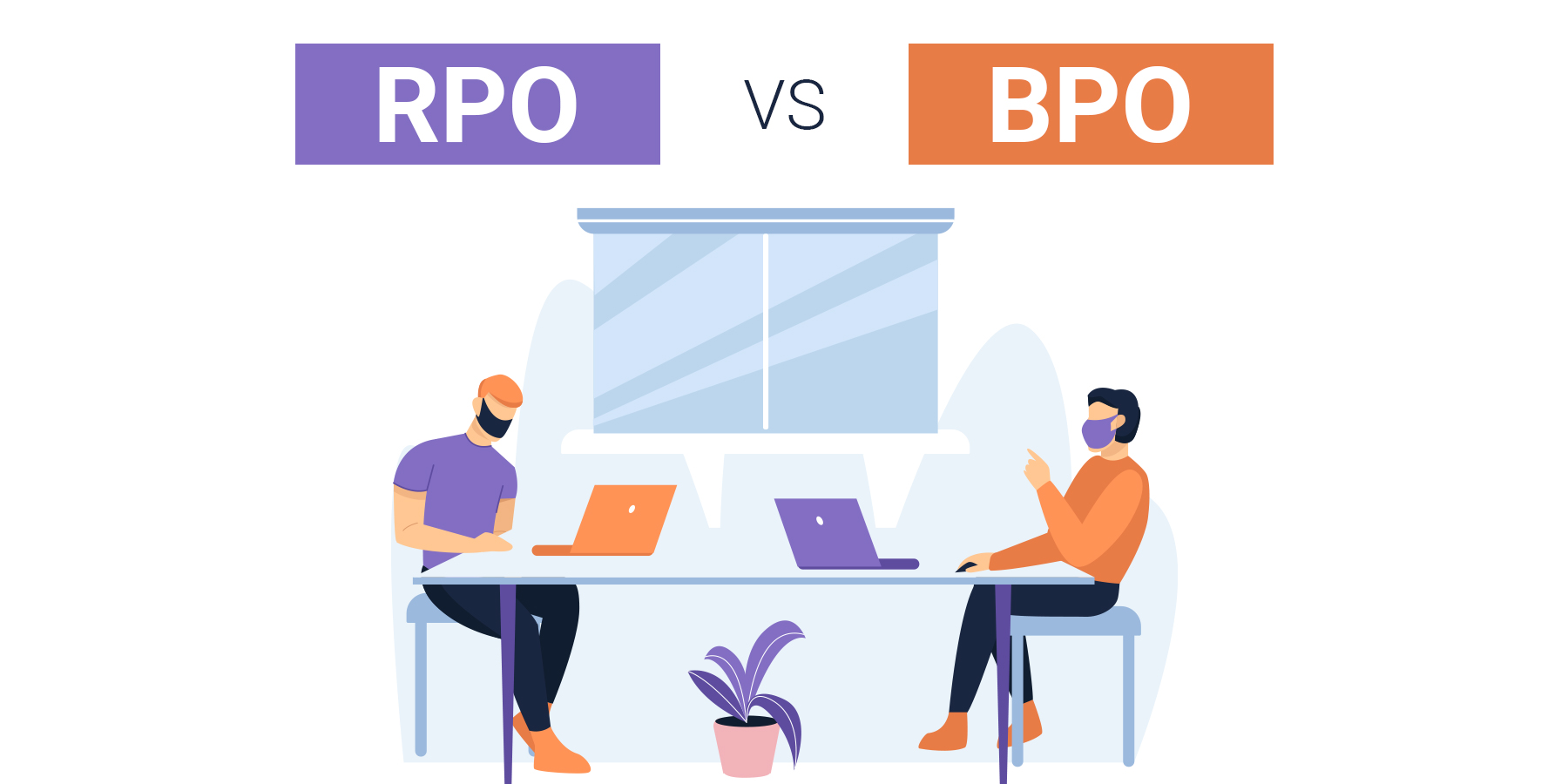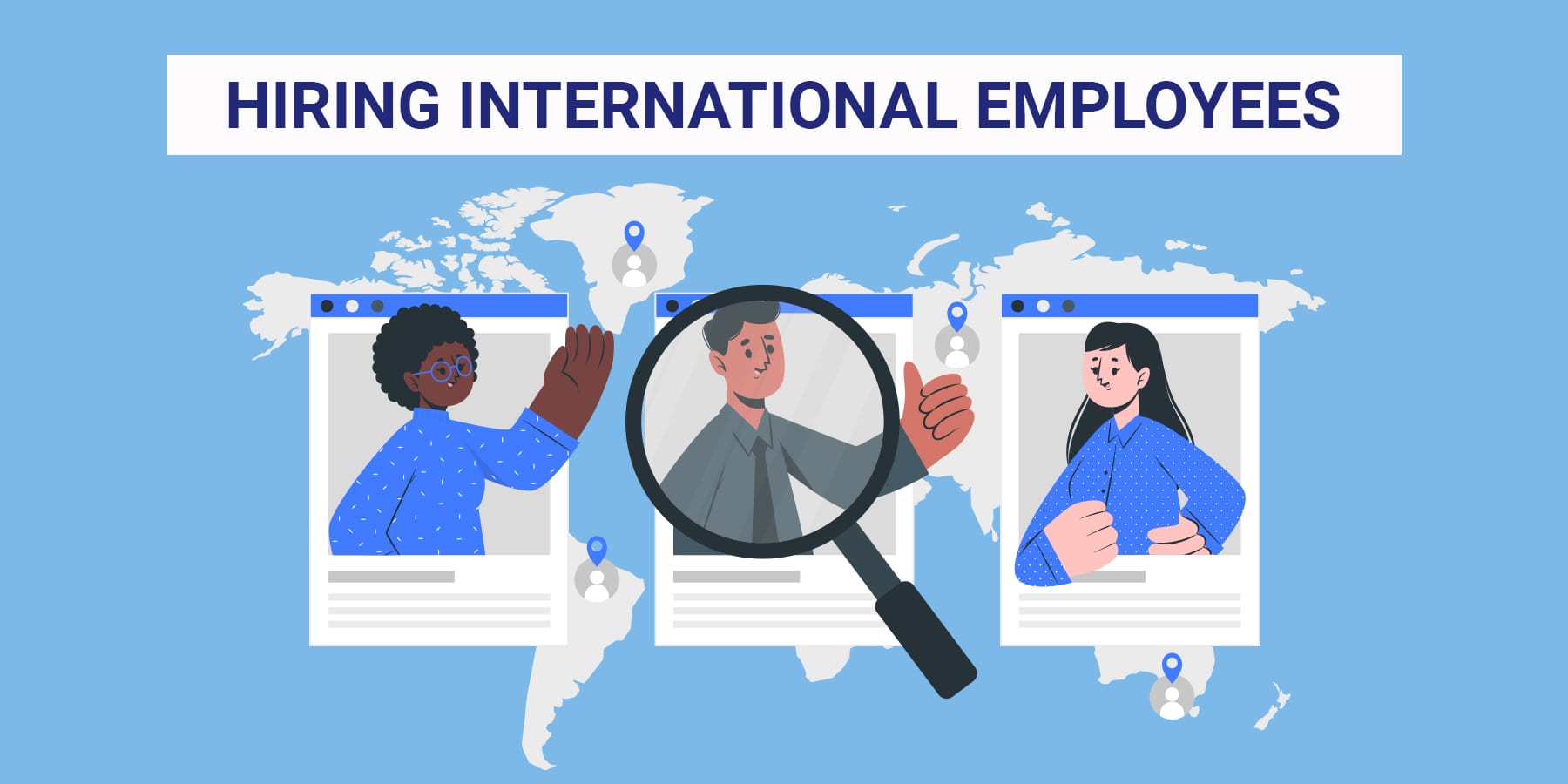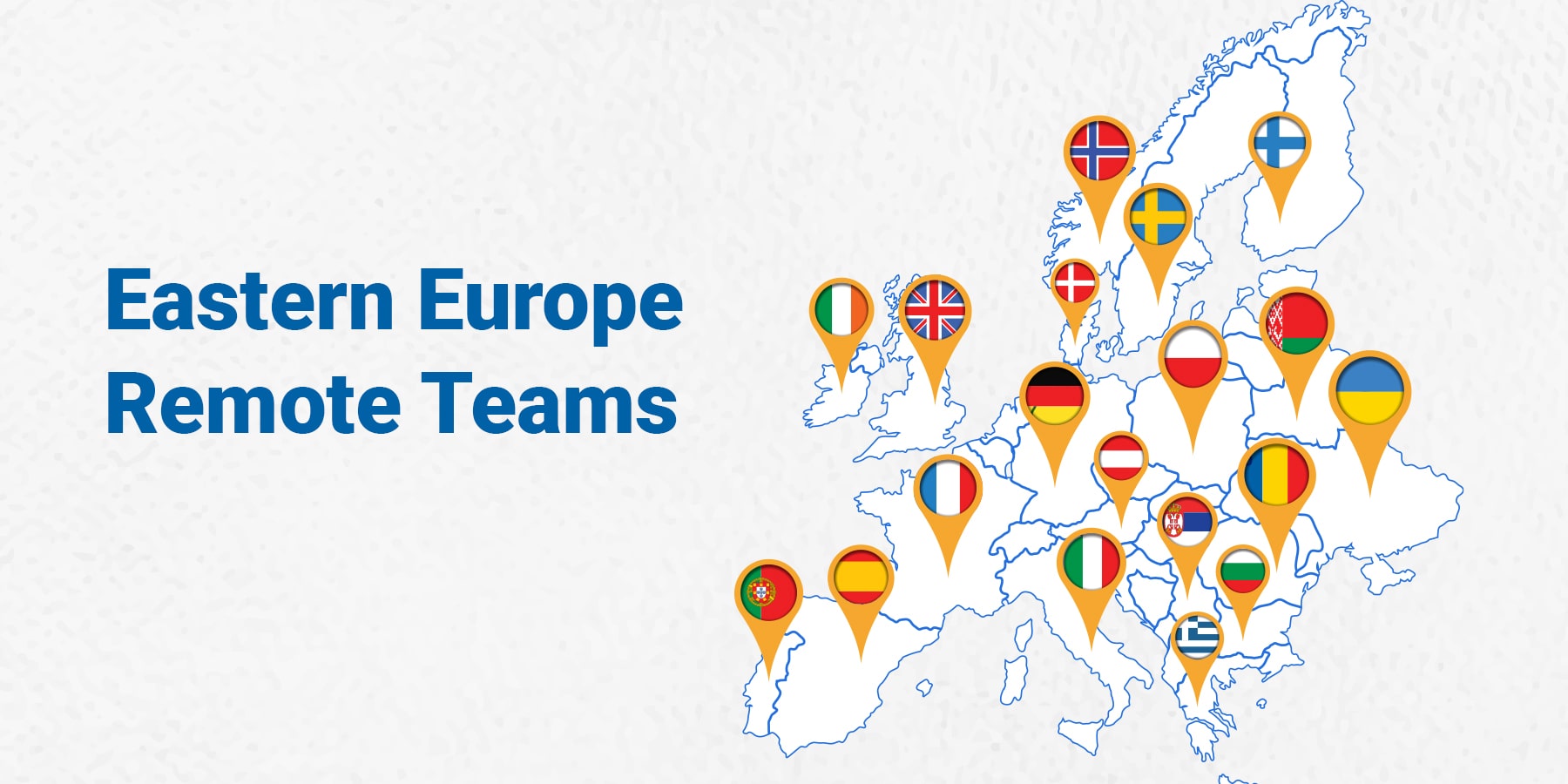
Every company has unique issues and requirements, whether it’s the difficulty of meeting non-essential operation demands or hiring the right talent to help the company expand in the best way possible.
Whatever the case may be, providers have particular solutions to meet it. Two options are recruitment process outsourcing (RPO) and business process outsourcing (BPO).
In essence, recruitment process outsourcing (RPO) is a subset of business process outsourcing (BPO) in which an employer outsources all or part of its recruitment operations to an external service provider. In contrast, BPO involves outsourcing non-essential business tasks to a third-party provider.
What are the primary distinctions? We go into greater depth below.
The Difference between Recruitment Process Outsourcing and Business Process Outsourcing
Recruitment Process Outsourcing
Today’s recruitment processes are pretty complicated. To hire the best people, you need to go through a tough job market, learn about the right technologies, and take care of both the job seekers and the people doing the hiring. It helps you find and bring in the best team members. Recruitment process outsourcing companies are subject-matter specialists; their crucial strength is talent acquisition.
Recruitment process outsourcing companies understand the recruiting landscape, stay current on recruiting technologies, and have the resources to increase recruiting capacity to match hiring demands. They integrate people, technology, processes, and analytics into the talent acquisition function.
“The number one reason firms succeed, struggle, or fail directly corresponds to who they hire,” says John Younger, RPOA co-founder and talent acquisition expert.
What Services Do Recruitment Process Outsourcing Companies Provide?
Depending on the needs of the organization, a recruitment process outsourcing solution can provide:
- Managing hiring fluctuations throughout the year.
- Lowering total recruiting costs and reliance on staffing agencies.
- Improving hiring manager satisfaction.
- Lowering time-to-fill.
- Elevating the employment brand.
- Improving candidate experience.
- Simplifying or streamlining the hiring process.
- Freeing up time for other tasks, among other things.
A third-party recruiting firm, an extension of the HR department, provides recruitment in a Recruitment Process Outsourcing (RPO) model, either off-site or on-site. It’s frequently utilized for high-volume recruiting (for example, call center employees), short and medium roles on a project-by-project basis, and, ultimately, replacing all internal recruitment in an organization.
Recruitment process outsourcing is more than just filling vacancies when there is a strong demand; it is also about improving your organization’s overall outsourcing recruitment process. It significantly reduces internal HR time because it handles the entire outsourcing recruitment process, allowing teams to focus on other vital tasks.
Recruitment process outsourcing companies will also take the time to study your company’s structure and culture to describe the main criteria of the ideal candidate for the role.
Business Process Outsourcing
Business process outsourcing recruitment is a type of outsourcing in which a business hires a third-party service provider to perform one or more of a company’s business processes. The third party oversees all operations linked to the business function.
Contracting non-essential business tasks to a third-party supplier is known as business process outsourcing. You call this outsourcing process – either front or back office work – as BPO.
One can divide the BPO industry into three categories based on location:
Hiring a third-party supplier to conduct business operations in a country other than where the products or services are developed or manufactured is known as offshore outsourcing recruitment. For example, you may spread your customer care to different nations and provide the customer with a native experience.
Nearshore outsourcing recruitment occurs when the third-party supplier has its base in a country adjacent to the one in which the firm is located. For example, if the location of your company is Ireland, the BPO supplier would be found in the United Kingdom or another nearby country.
Onshore outsourcing recruitment occurs when the BPO provider has its location in the same nation as the contracting company.
What is the Purpose of BPO?
Organizations hire BPO suppliers for two key reasons:
Payment processing, information technology services, quality assurance, and other such activities are examples of back-office operations. Front-office operations include marketing, sales, customer service, and grievance resolution.
Organizations frequently outsource one or more functions. Instead of outsourcing entire HR activities, the corporation may outsource only payroll processes.
The BPO sector has grown significantly and now provides organizations with a wide range of services and tasks.
BPO Varieties
BPO organizations come in different types based on where they are:
Onshore Outsourcing Recruitment: This is when a company gets help from a service provider in its own country. It’s like hiring assistance within the company’s borders, and people also call it domestic outsourcing.
Nearshore Outsourcing Recruitment: If a business hires a service provider in a nearby country, it’s known as nearshore outsourcing. It’s like getting help from a neighbor.
Offshore Outsourcing Recruitment: When a company hires a service provider in a different country, it’s offshore outsourcing. It’s like getting assistance from a place far away.
Making a Decision on BPO
Change management is required when transferring in-house work to a BPO provider because it affects staff, workflow patterns, and overall business operations. The decision-making process for outsourcing operations includes the following steps:
- A company’s executives outsource a business operation or a portion of it.
- They weigh the benefits and drawbacks of the action and determine whether it makes strategic sense for the organization.
- They choose the best BPO for the job and outsource it to an external service provider.
Benefits of BPO
1. Lower Costs
One primary reason firms outsource is to save money. Instead of buying computers and hiring more people for specific jobs, companies can hire an outside service to do those tasks. This helps reduce or eliminate extra costs for things like equipment and additional workers.
2. Increased Effectiveness
BPO firms have extensive experience in various sectors and deliver excellent results. They also follow best practices and use cutting-edge technologies. It naturally leads to increased efficiency and productivity.
3. Concentrate on Fundamental Business Functions
Lots of companies, especially new ones, need assistance with extra tasks. Shifting tasks that aren’t their focus to a BPO (business process outsourcing) company frees up time for them to concentrate on their core business activities.
4. Global Enlargement
Imagine a company that wants to start selling products in another country. It might need help with understanding the local market, knowing the laws there, or speaking the language. So, it can ask a BPO (business process outsourcing) company to handle these tasks. It makes the business work better and grow faster.
BPO Disadvantages
1. Concerns about Security
Working with a BPO business may result in a security breach because sensitive data must be exchanged and processed.
2. Reliance on the BPO Company
If a company outsources its work to a BPO (business process outsourcing) for a long time, it might get used to the BPO’s methods and depend on them too much. If the BPO asks for more work, the company might pay more than the usual cost.
3. Communication Issues
Working with a BPO (business process outsourcing) provider from another country might be tricky because of the language difference. If you’re outsourcing jobs that need many people, like development or IT services, mistakes can happen because of misunderstandings. Fixing those mistakes can get expensive sometimes.
4. Unexpected or Hidden Costs
Because work is not always hard and quick, the organization may underestimate the quantity of work, resulting in higher-than-expected expenditures. Working with a BPO business may result in legal fees if there is a dispute or disagreement. Delays in work delivery can also result in indirect costs.
Outsourcing Ways to Improve Your Business
While Recruitment Process Outsourcing and Organization Process Outsourcing are distinct, they share one goal: to improve your overall business.
Recruitment process outsourcing provides the talent you need to expand your worldwide footprint, whereas BPO offers the peace of mind to focus on your core business tasks. Both are necessary for a successful business.
Do You Want to Learn More about Outsourcing?
Recruit Ninjas is a global provider of people to start-ups, large multinationals, and SMEs in every industry. We can assist you in defining a set of procedures for workforce planning to avoid or reduce people problems, capitalize on talent possibilities, and optimize your talent pipeline.
Do you think about outsourcing recruitment or other operations? Why not arrange a free consultation with a member of our team? We’d be delighted to assist!
Andrew Gray
Andrew Gray is the Senior Operations Manager at Vserve Amazon Listing Services, a position he's held since 2021. He is renowned for operational excellence, leading teams to achieve sales growth and enhanced customer service. Andrew's role is crucial in optimizing the company's operations and maintaining its reputation for efficient back-office solutions.




 All About Hiring International Employees For Your Business
All About Hiring International Employees For Your Business Your eCommerce Needs a Remote Team from Eastern Europe
Your eCommerce Needs a Remote Team from Eastern Europe